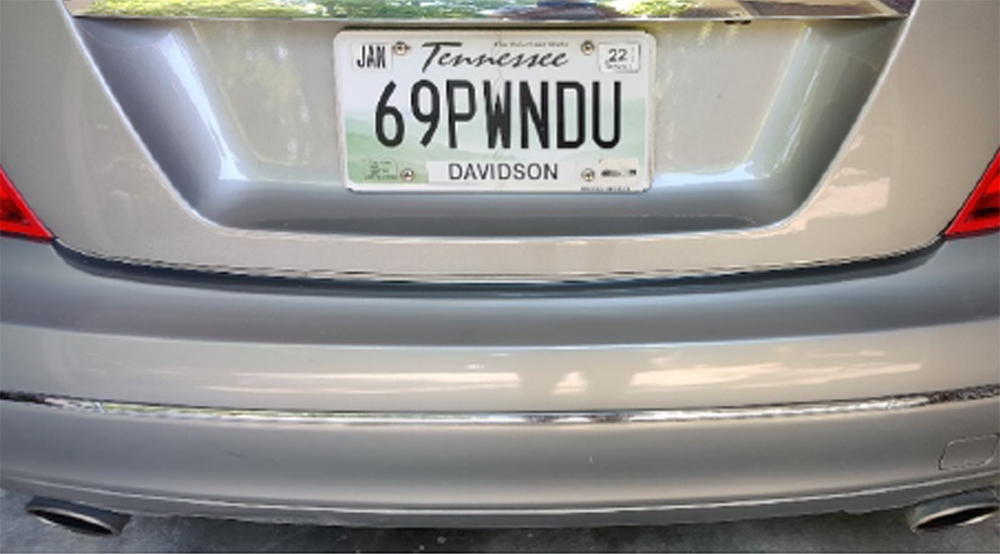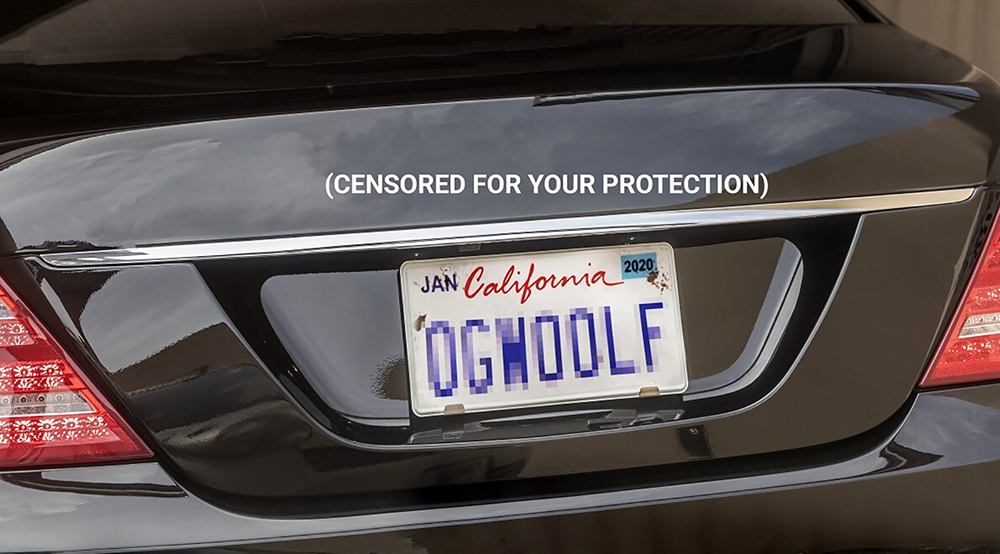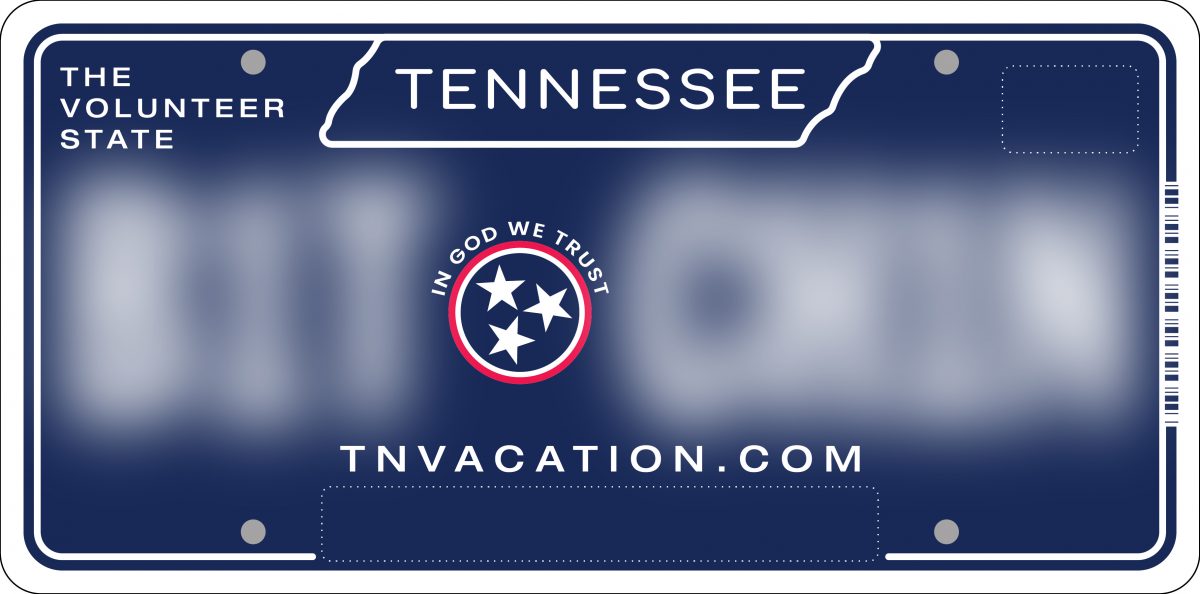Sex and, maybe, sexual dominance were broadcast from the license plate of a Nashville woman who says the Tennessee Department of Revenue (TDOR) officials allowed the vanity tag for a decade but now say it’s illegal because someone complained to the department’s chief of staff.
In July, the Flyer told readers about the woman who sued the state after it revoked the vanity plate, which reads “69PWNDU.” Leah Gilliam got the plate in 2011 to marry her loves of astronomy and gaming, her lawyer claims in the suit filed against TDOR in July. She said the “69” part references the 1969 moon landing. The “PWNDU” part references “pwnd,” a common gaming term for “owned.” So, “pwndu” means “owned you,” or something like “I have dominated you in this video game.”
A ruling on the matter was expected early this week but was not available at press time. Check memphisflyer.com for updates.


Who PWND Whom?
No one — state officials or members of the public — lodged any formal complaint against Gilliam for a decade. Her cars — a Volvo and two Mercedes-Benzes — carried the personalized banner until Gilliam received a surprise letter from TDOR on May 25th that the plate had been “deemed offensive.” She was instructed to return the plate immediately or face fines and up to 30 days in jail.
In June, Gilliam requested a hearing about the plate, explaining its phrase “is a gaming term and — above all — not rude, mean, or implying anything other than a friendly term for ‘I won.’”
“It is my hope I can get some younger jurors at my hearing who are familiar with the term and can enlighten the non-gamers in the crowd,” Gilliam wrote in June.
In 2018, Gilliam requested three choices for her vanity plate: “69PWNDU,” “PWNDU69,” and “IPWNDU.” She preferred “69PWNDU” and explained on the form that “PWND = video gaming term. [69PWNDU] is my Google phone.” The plate was approved.
By July 9, 2021, Gilliam’s case was before Administrative Law Judge Phillip Ewing. Daniel Horwitz, of the Nashville-based firm Horwitz Law, represented Gilliam. Camille Cline, assistant general counsel in TDOR’s legal office, represented the state of Tennessee. The conference was brief, set to establish that the attorneys would need time to gather documents for evidence and set future meetings. It also set the stage for a fight.
Horwitz asked, “My question was whether or not the state is going to take the position that they screwed this one up and that they should not have demanded this revocation. Is that going to happen?”
Cline responded, “No, sir. No, we are not going to take that position.”
Tennessee state law “requires” TDOR officials (including the commissioner of the department) to refuse to issue any vanity plate “that may carry connotations offensive to good taste and decency.” As for “69PWNDU,” it satisfied this part of the law, according to state attorneys, as it “was deemed to have a sexual association.”
“Specifically, the department determined that the significance of the configuration was likely interpreted to mean ‘69 pound you,’ which includes two terms or phrases with a sexual association,” reads the state’s explanation. “The numerical sequence ‘69’ is likely to be understood to reference a particular sexual activity; whereas, ‘pound you’ is a colloquial phrase that is also likely to be ascribed a sexual association.
“Additionally, the configuration could also be interpreted to mean ‘69 pwned [sic] you,’ with ‘pwned’ [sic] being a term frequently used by the gaming community in situations where one player has ‘owned’ or dominated another player. When this portion of the configuration is combined with the ‘69’ sequence, it could be read to signify sexual domination.”
In his legal complaint, Horwitz argued Tennessee’s law discriminates against Gilliam’s federally protected rights to free speech. The law, and the revocation of her plate, violated the First Amendment, Horwitz claimed, on the basis of both content and viewpoint. That is, laws cannot stop speech based on what it says (the content). Laws also cannot stop speech because of the underlying views in the message (the viewpoint).
“A law banning all political speeches in a public park would be content based,” according to the First Amendment Encyclopedia from the Free Speech Center at Middle Tennessee state University. “A law banning only political speeches by members of the Socialist Party would be viewpoint based.”
Horwitz also complained the Tennessee law is vague, does not adequately describe what it prohibits, leaving “reasonable people to guess at its meaning,” and “leaves the definition of its terms to law enforcement officials.”
For this and more, Gilliam and her attorney wanted to stop the state from revoking her “69PWNDU” plate, stop the state from revoking any vanity plate, the court judge to rule the law unconstitutional, for the state to pay court costs and attorney fees for Gilliam, and pay damages in the amount of $1 for every day she was forbidden from displaying her license plate.
State attorneys argued Tennessee’s personalized license plate program could not violate First Amendment rights. The program “involves government speech, which is outside the scope” of free-speech rights. Also, the program “is a nonpublic forum” and laws regulating it cannot violate the First Amendment. They also argued, generally, that laws governing the vanity plate program are not “unconstitutionally vague.” They asked the judge to declare the law constitutional, affirm TDOR’s decision to revoke the “69PWNDU” license plate, dismiss claims against TDOR Commissioner David Gerregano, and to have Gilliam pay all costs associated with the matter.
Interesting stuff emerged when state lawyers began handing over documents in the case. Horwitz wanted a list of every Tennessee license plate — personalized or not — that included “69.” State attorneys said the request was overly broad as there are over 250,000 license plates that contain the “69” sequence, including many non-personalized plates they deemed irrelevant to the case.
Those attorneys, however, turned over a list of active vanity plates in Tennessee that include “69” and were approved by TDOR. Most of them — the lion’s share of them, actually — are harmless reference to cars like “69ETYPE,” “69BUG,” “69FORD,” “69VET,” or “STANG69.” At least two — “697IBEW” and “IBEW969” — are references to labor unions.
Another — “USAFA69” — seems to be a reference to a graduation date from the United States Air Force Academy. “USMC69” seems to reference to service in the United States Marine Corps. Another — “ETSU69” — may communicate a graduation year from East Tennessee University. “ELVIS69,” perhaps, references the artist’s continued revival in that year. “LOSTN69” may even communicate a sweet nostalgia for a time gone by.
Others may be easy to understand but hard to know the intent: “KARMA69,” “MAGIC69,” “COOK69,” “FROG69,” “HUB69,” “PONY69,” “SUMMR69,” and more. Some of them, however, are harder to decipher: “PM37369,” “ROATE69,” “VLB669,” “X69,” “52769,” “656909,” and “356911.”
It does seem, though, that some naughty (but crafty) “69” aficionados got plates past the state censors. Consider “REAL69Z,” “TOPLS69” (both of which may be auto references), “694FUN,” or, simply, “I69.” The meaning of two plates are hilariously obvious, “42069” and “69420.” All of those, including “Gilliam’s “69PWNDU,” were approved at one point by officials in Nashville and released into the wild.
So, who are these officials? How do they decide what gets stamped on a plate and what does not? These were the central questions in an August deposition by Horwitz to Demetria Hudson, TDOR’s assistant director of vehicle services.
She said the plate caused no issues from May 2011 to May 2021. One day that month, someone verbally complained about the plate to Justin Moorhead, chief of staff in TDOR. After 10 years on the road, the department got that one complaint, reviewed the tag, and deemed it offensive. Why?
“Because it represents the department and it sends a message to the constituents that the department released one … a license plate … what the license plate entails … ,” Hudson said.
She said the “69PWNDU” plate was not protected by the Constitution because it was “harmful because somebody complained about it and took offense to it.” Asked about the department’s definition of “offensive,” Hudson said she wasn’t sure how state law spells it out. However, she gave an impromptu definition of “offensive,” saying it means “anything … that makes someone uncomfortable, or readily angry, or upset … ” and said that was the department’s definition of it. She said she got the definition from Webster’s Dictionary but wasn’t sure the department relied on it totally to define “offensive.” Similarly, Hudson said her department did not have formal definitions of “good taste” or “decency” and no training materials defined them.
However, she said the department does have formal regulations to determine whether or not a plate can be deemed offensive. She was not sure, though, that those regulations were “published for the public to see.” But the rules include a glossary of prohibited terms. She described those as “anything that pertains to ethnic or racially … ethnic, racially, sexual, violence, patriot.”
Asked about ethnic terms, Hudson said she didn’t know them all off the top of her head. When asked to name some she said, “things like white trash … or honky.” [Editor’s note: She was able to remember some other derogatory ethnic terms that don’t belong in this paper.] Asked about sexual terms, Hudson replied “things like screw you, 69 you,” but “that’s all I can think of off the top of my head.”
As for formal vetting of plates, Hudson said “[O]ur objectionable table is checked and then we also check Google search and Urban Dictionary.”
Answering questions from Horwitz, Hudson said “69420” should not be allowed on a license plate “because the 69 have [sic] sexual connotations.” Neither should “42069.” Neither should “694FUN,” “69BEAST,” “69BOSS,” “I69,” “69PONY,” “SMOKIN69,” or “TOPLS69.” Hudson did say that all of those plates should have been vetted before they were approved.
She said “69” alone was not enough to disqualify a plate. The number’s context had to be sexually explicit. However, she said she was sure sexually explicit “69” plates have “slipped through.”
Unsettled Law
Ken Paulson, director of the Free Speech Center at Middle Tennessee State University, said Tennessee would have to show “extremely strong state interest” in banning any kind of speech from its license plates. He believed last week its regulations on them would be overturned.
“Offensive speech is protected by the First Amendment,” he said. “In fact, you only need a First Amendment to protect offensive speech. You don’t need protection for speech that everyone agrees with.”
So far, the U.S. Supreme Court has not ruled on license-plate speech. Two federal court rulings have gone in opposite directions on the matter, he said, and Tennessee’s ruling will likely follow one of those.
In 2001, the 8th U.S. Circuit Court of Appeals said Missouri officials violated the First Amendment rights of a woman by denying her request for the license plate “ARYAN-1,” according to the Freedom Forum Institute. That same year, the 2nd Circuit said Vermont officials could deny a vanity plate that said “SHTHPNS” because license plates are a nonpublic forum and government officials can regulate them.
With no official ruling from the highest court in the land, states make up their own laws on plates and how to manage First Amendment protections on them. Paulson said two federal judges have decided what the Constitution says, and the rest is “fine tuning by state legislators.”
Case Study: California
Chris Ogilvie sued the state of California in March 2020 after he was denied his vanity plate. The plate, “OGWOOLF,” was a mash-up of two of his nicknames. “Og” was his military nickname, and “Woolf” was his nickname back home. It was deemed offensive as “OG” could be read as an acronym for “original gangster” and was too offensive for other motorists.
The Pacific Legal Foundation took up the case and added four others to join the suit. “DUK N A,” short for “Ducati and Andrea,” was rejected because it sounded like an obscene phrase. “BO11UX” was rejected because the term was said to have sexual connotations. “SLAAYRR,” a reference to the metal band, was rejected because it was considered “threatening, aggressive, or hostile.” “QUEER,” a reference to a musician’s identity and record label, was rejected because it was considered insulting, degrading, or expressive of contempt.
The group won the suit in November as a federal judge ruled the state’s restriction of vanity plates it considers “offensive to good taste and decency” was unconstitutional.
“This is a great day for our clients and the 250,000 Californians that seek to express their messages on personalized license plates each year,” said Foundation attorney Wen Fa. “Vague bans on offensive speech allow bureaucrats to inject their subjective preferences and undermine the rule of law.”
Case Study: Rhode Island
A Rhode Island man Sean Carroll and the American Civil Liberties Union of Rhode Island argued to a federal judge in July 2020 that he should be able to put a plate on his all-electric Tesla that reads “FKGAS.” Carol contended the phrase read “fake gas.” He displayed the tags for six months until another driver complained to the state Department of Motor Vehicles.
Attorneys for the state contended vanity plates are sold to raise money for the state. They said the plates were government property, and they are not a public forum to express themselves.
However, the judge ruled that the state’s law on such plates was vague and violated Carroll’s First Amendment rights.
“I am thrilled with [the judge’s] decision on my First Amendment right allowing me to express my views through my vanity plate,” Carroll said at the time. “The only thing better is to be able to continue to see all the smiles, laughter, thumbs up, and fist bumps in the rear-view mirror as people continue to read and get the humor in my message.”
Case Study: Maine
Maine stopped vetting vanity plates altogether in 2015. The program was loose enough that WGME reporters this year found 40 vanity plates that straight-up used the “F” word, and dozens had variations on it. Another review by the Bangor Daily News found as many as 400 “obscene” plates with phrases like “FARTN,” “KISMYAS,” and “PHUKU2.”
But those wild and free days ended this summer. Maine lawmakers passed a bill that created “appropriate standards” for the Secretary of State to follow when approving vanity license plates. The bill became law in June.
Maine Secretary of State Shenna Bellows, a former director of the American Civil Liberties Union of Maine, testified in support of banning the plates, according to a story from The Boston Globe.
“The First Amendment protects your right to have any bumper sticker you want, but it doesn’t force the state to issue you a registration plate that subjects every child in your neighborhood to a message the government wouldn’t allow them to see in a movie theater,” she told lawmakers.
The rules were not formally passed by the Maine legislature. Though, many expect the rules to face many legal challenges before they can be enacted.
Printing Plates and Money
Paulson agreed that the issues would all be cleaner if states just did not allow personalized license plates. They aren’t likely to stop, though, because they make money. In the 2020 fiscal year, Tennessee’s personalized plate program yielded $368,041.66 to state coffers, according to the TDOR.
But Paulson noted that while these issues seem countless and the topic is “fascinating,” it’s hardly a “pressing level matter.” The First Amendment Center is nonpartisan, he said, and does not lobby nor litigate.
“But as a matter of philosophy, we believe America is stronger if everybody is free to express themselves in any medium they choose,” he said.
